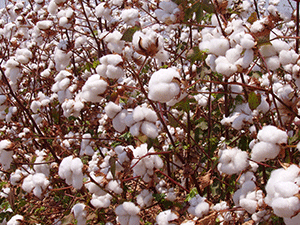
Tanzania: higher-quality cotton to boost exports (en)
The International Trade Centre (ITC) has assisted in the training of 675 cotton workers in the United Republic of Tanzania in contamination-reduction. It will allow them to produce higher-quality cotton, and it has already enabled them to secure an order from Thailand for 1,000 bales of lint.
The training, which is part of a broader effort to link African ginners to new export markets in Asia, took place from 21 July to 7 August in the East African country. It was coordinated with Lucky Spinning, a Thai yarn-manufacturing company that sent a raw-material adviser to 22 ginneries in the Shinyanga and Mwanza regions.
The purpose of the training programme was to make cotton producers and ginners aware of the consequences of contamination, then teach them to identify it and eliminate or lower it to levels that are acceptable to clients. Cotton with fewer contaminants is more competitive in global markets, resulting in higher incomes for producers.
Analysis of Tanzanian cotton showed that it has good fibre characteristics, but because of high levels of contaminants, the cotton is either rejected or sold at discounted prices. The trainer from Lucky Spinning presented ginners with information about Thailand’s cotton imports and quality requirements, as well as data comparing Tanzanian cotton with cotton from other origins. Following inspection tours of each of the ginneries that were visited, the trainer provided reports on observations of positive and negative practices.
Initial results
Afrisian Ginning Ltd., a Tanzanian ginning company, implemented changes recommended by the trainer, and a report conducted a week after the training revealed reduced levels of contamination in its cotton bales. According to Lucky Spinning, the analysis showed that the cotton came ‘very close’ to meeting its quality requirements. As a result, Lucky Spinning has agreed to purchase 1,000 bales of lint.
Afrisian Ginning has since reduced contamination levels by 50%. The company now performs daily bale inspections, uses more employees to pick out contaminants at cotton-feeding areas and holds cotton-awareness meetings twice a month.
The company has plans to further reduce contamination levels by providing hip bags for all employees to collect contaminants in their areas and by displaying signs to inform employees about contamination.
Meanwhile, the Tanzanian Cotton Board has plans to carry out stricter controls at buying posts to improve storage and transportation of seed cotton and to reduce contamination levels.
Looking forward
During this trip, ITC representatives met directors and general managers of ginneries, as well as members of the Tanzanian Cotton Board, to discuss ways to evaluate the effectiveness of the training and ensure sustainability of quality-control measures.
ITC is working on organizing the next phase of the training programme in the country, collaborating with trainers from spinning mills in Bangladesh.
By facilitating this type of cooperation between African cotton exporters and Asian spinners, ITC works to build transparency within the production chain and build long-term partnerships. This cross-border cooperation is part of the African Cotton Promotion component of the European Development Fund 10 cotton project.



